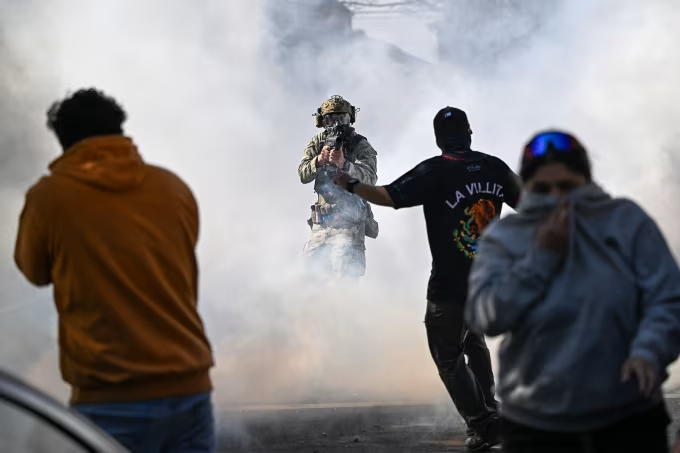PORTLAND, Ore. — The Trump administration secured a partial legal victory on Monday as the Ninth Circuit Court of Appeals overturned a lower court order blocking the deployment of the Oregon National Guard in Portland. While the ruling removes one major obstacle, federal troops are not expected to be on the ground immediately, as a second restraining order remains in effect.
In a 2-1 decision, the appellate court found that “after considering the record at this preliminary stage, it is likely that the President lawfully exercised his statutory authority.” The ruling, supported by two judges appointed by President Donald Trump, reversed a temporary restraining order issued by U.S. District Judge Karin Immergut, who had recently extended two orders preventing the mobilization of federal forces in Portland.
The decision represents a significant win for the administration, which has been actively pushing to deploy federal troops in several Democratic-led cities amid ongoing protests over immigration enforcement policies. Local and state officials have repeatedly argued that these deployments are excessive and politically motivated.
Deployment Timeline Still Uncertain
Despite the appellate ruling, troops cannot be immediately deployed to Portland because a second restraining order remains in effect. That order prevents the federal government from mobilizing National Guard forces from anywhere in the United States within Oregon. The administration has argued that both orders rely on the same legal reasoning and should be overturned to allow the deployment to proceed.
Governor Tina Kotek voiced her concern over the prolonged uncertainty surrounding the deployment. “I’m very troubled by the decision of the court. These citizen soldiers have been pulled away from their families and their jobs for weeks to carry out some kind of mission in Oregon,” Kotek said during a press conference on Monday. Officials say even if the second order is lifted, it remains unclear how many troops would be deployed and when, due to limited communication from federal authorities.
Appeals and Dissenting Opinions
Judge Susan P. Graber, appointed by former President Bill Clinton, dissented from the majority opinion. “Today’s decision is not merely absurd. It erodes core constitutional principles, including sovereign States’ control over their States’ militias and the people’s First Amendment rights to assemble and to object to the government’s policies and actions,” she wrote.
Oregon Attorney General Dan Rayfield also criticized the ruling, calling for the Ninth Circuit to consider an “en banc” review, in which a larger panel of 11 judges would re-examine the case. Attorneys for both the state and the Trump administration have until Wednesday midnight to submit arguments for the potential rehearing.
Background of Portland Protests
Portland has experienced intermittent protests since June in response to the Trump administration’s immigration policies, particularly actions involving the U.S. Immigration and Customs Enforcement (ICE). While protests were initially intense, the city had seen a period of relative calm until federal officials announced the deployment of 200 National Guard troops in late September.
Federal authorities have characterized Portland as “war-ravaged” and experiencing uncontrollable violence, a claim strongly disputed by local leaders. Governor Kotek told the court that the situation in Portland is nowhere near as extreme as federal officials portray. City officials emphasize that local law enforcement continues to manage protests effectively, often with support from community organizations.
Senators Request Investigation into National Guard Deployments
In a letter to the Defense Department Office of Inspector General, a bipartisan group of senators—including representatives from Oregon—requested a review of recent National Guard deployments across the country. They cited concerns over the constitutionality of deploying troops over state objections and the strain such actions place on military readiness and resources.
“We urgently request that you initiate an inquiry into the cumulative effects of these domestic deployments of U.S. active-duty troops and the National Guard—over the objections of state and local officials—on military readiness, resources, personnel, and our military as an institution,” the senators wrote.
Implications for Other States
The Oregon ruling coincided with legal challenges in Illinois, where state and city officials sought Supreme Court intervention to block the deployment of federal troops. Authorities argued that protests at the ICE facility in Broadview were manageable and did not justify federal intervention, describing the administration’s actions as “independently unconstitutional.”
Similarly, in Tennessee, seven elected officials filed a lawsuit challenging Governor Bill Lee’s deployment of National Guard troops to Memphis, arguing it violated both state law and the Tennessee Constitution. Officials noted that the conditions cited for deployment, including rebellion or invasion, do not exist in Memphis today.
Meanwhile, President Trump has indicated plans to deploy National Guard troops to San Francisco, prompting pushback from city and state officials. Mayor Daniel Lurie emphasized that the National Guard does not have the authority to enforce local law against drug dealers and that the city has seen a decline in violent crime and tent encampments through local enforcement efforts. California Governor Gavin Newsom also criticized the plan, warning that such a deployment could disrupt the city’s public safety strategies.
Looking Ahead
As legal challenges continue nationwide, the federal government’s authority to mobilize National Guard units in response to domestic protests remains highly contested. The outcome in Oregon, and in potential en banc hearings, could set precedent for other states facing federal intervention, highlighting ongoing tensions between state sovereignty and federal authority.

